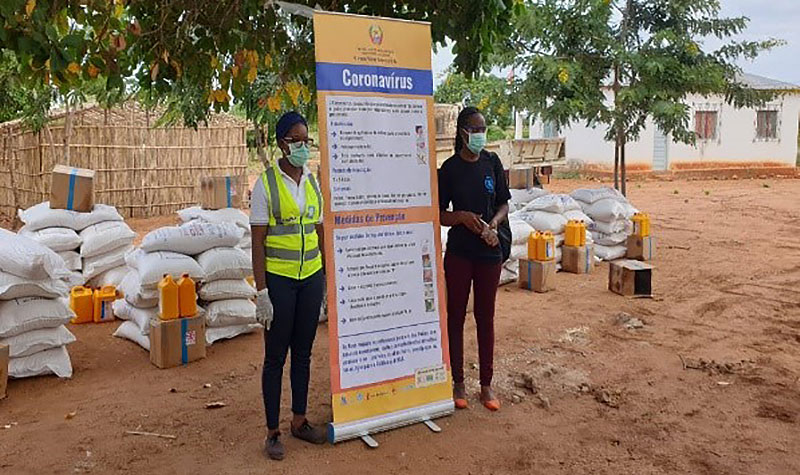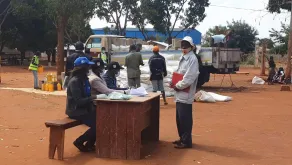On 9 October 2020, the World Food Programme (WFP) was awarded the Nobel Peace Prize. Despite the threats posed by COVID-19, WFP is working around the clock to maintain food assistance programmes which offer a lifeline to 87 million people globally. UN Volunteers are an integral part of WFP operations, and share their contributions.
COVID-19 threatens millions already vulnerable due to food insecurity
Just a couple of months before COVID-19 spread across nearly every border in the world, Ângela Gregório António Chale Macie began serving as a UN Volunteer in Nampula, Mozambique. Little did she know just how critical her role would become for the people in Erati district when the Coronavirus endangered their already-limited access to food.
The Coronavirus is threatening millions of people already vulnerable due to food insecurity, malnutrition and the effects of conflict, climate change and other disasters. --Ângela Macie, UN Volunteer Field Monitor with WFP
As a field monitor, Ângela is responsible for overseeing the monitoring and evaluation procedures in all of Erati’s health centres, specifically for programmes related to nutrition.

Ângela Macie leading a COVID-19 information-sharing session during a WFP food distribution activity. ©UNV, 2020
Ângela collects, prepares, and submits both weekly and monthly reports regarding the number of beneficiaries of their food programs as well as any supplemental stocks.
Accurate data is essential to adequately prepare for the community’s food needs. Through data collection, it is possible to obtain complete data that, after analysis, helps us predict the needs of health units. --Ângela Macie
In addition, Ângela must ensure that the health centres’ stock of items follow the recommended procedures, from receiving and registering to packaging and handling both nutritional products and non-food items.
Ângela’s role as a UN Volunteer doesn’t stop there, though. Food programmes require the collaboration of various community actors. She coordinates meetings with local entities, including the government administration and the District Service for Economic Activities. Together, they employed a food-for-asset (FFA) programme from February to April, providing monthly food rations to households during the lean season, a period of extreme food scarcity. In exchange for the rations, recipients contribute to building their communities’ assets.
During this period, I supported the Christian Council of Mozambique by monitoring the field openings, rehabilitating roads, and planting fruit trees and sweet potato branches. --Ângela Macie
With the COVID-19 crisis well underway at this time, Ângela and her team adapted the programme to include important health information for recipients. "We offered communal lectures in the field before distribution about the precautions to be taken to avoid contracting COVID-19, including how to social distance, wash hands thoroughly and wear a mask," she shares.
Nampula province, where Ângela works, has been one of the hardest-hit regions in the country. The country’s President, Filipe Nyusi declared a national state of emergency from 1 April 1 to 31 July, which included strict measures to prevent the spread of COVID-19. As at 9 September, Mozambique had reported 4,647 cases and as few as 28 deaths as a result of the Coronavirus.
The challenges continue to mount. Due to attacks by local insurgents, numerous people have been displaced from the province of Cabo Delgabo and are now being welcomed in Nampula province, where they are vulnerable and in need of food. Through the coordination efforts of the National Institute of Disaster Management (INGC) and WFP, these displaced persons are at the receiving end of food distributions.
Mozambiquans continue to face life-threatening obstacles, including food access, climate change, disease outbreaks and the economic consequences of the lockdown. Ângela knows that her work is far from over and that she will continue to make a commitment to her community as a UN Volunteer.
Behaviour change is essential to integrated climate risk management
In Mozambique’s Changara district, UN Volunteer Hortencio Muana has been a key member of the WFP integrated climate risk management project that began in January 2020. The project’s success can be attributed to the extensive dissemination of information at the community level, a project activity that Hortencio has been actively supporting.
One of the project’s tenants is access to meteorological information which measures the behaviour of rainfall within the district. By making this information available to farmers, they can better decide when to plant seeds and consequently reduce seed losses from uncertain rain patterns. --Hortencio Muana, UN Volunteer with WFP
Moreover, the project promotes the formation of cooperatives, where farmers can learn and exchange techniques and technologies related to group farming. They have also adapted their choice of crops and seeds according to a shorter cycle and resistant pests, two of the most alarming effects of climate change in agriculture.
Education and behaviour change are also critical components of the project. Through training on best practices for savings and credit, communities are strengthening their financial literacy skills, which will undoubtedly benefit their families, as well as future generations. Instances of behaviour change include using live and dead cover in agricultural fields. --Hortencio Muana
Agriculture’s intersection with health and economics is best reflected in the improved diets and promotion of rural markets in Changara district. Hortencio proudly notes that despite COVID-19 impacting communities negatively, they responded by taking the necessary precautions to protect themselves and their loved ones. People have welcomed the allocation of buckets of water, along with encouraging messages that promote hand washing, and are wearing masks while they go about their work.

